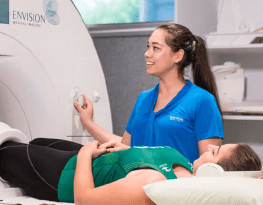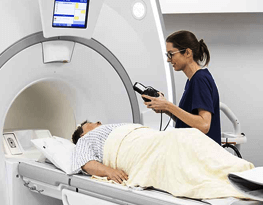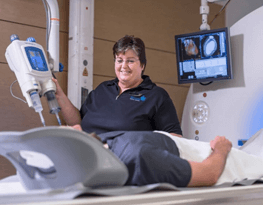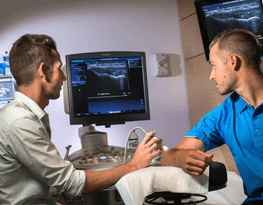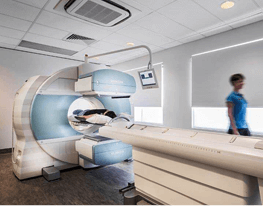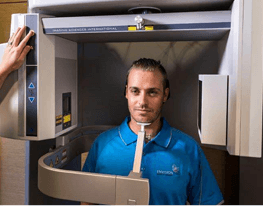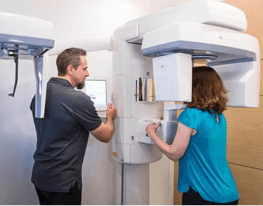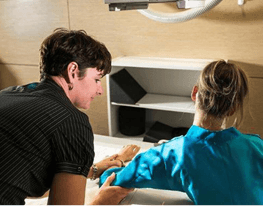What is MRI Enterography?
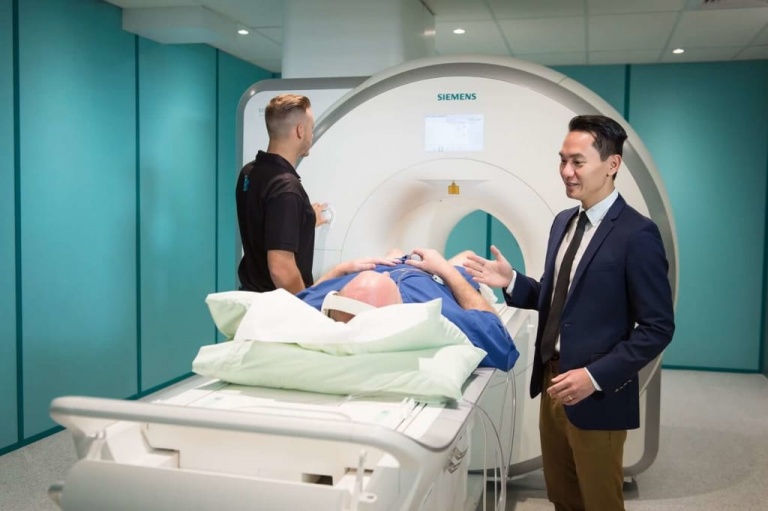
An MRI Enterography uses an MRI Scanner to produce detailed images of your small intestine. It can pinpoint inflammation, bleeding, and other problems. This requires you to drink 1-2 litres of fluid to distend the small bowel.
MRI Enterography
What happens during MRI Enterography?
A. Before your scan
Implanted Devices
Please read IMPORTANT INFORMATION REGARDING IMPLANTED DEVICES before your scan.
What to bring
- Your request form
- Any relevant previous imaging
- Your Medicare card and any concession cards
Preparation – The day before your scan
You should fast from 8pm the day prior to your scan. Some water is OK.
Preparation – On the day of the scan
You will be asked to fill out a MRI Safety Check list to confirm you do not have any contraindicated items or implants in/on your body. The MRI Technologist will ensure that no potentially unsafe items enter the scan room.
You’ll be given water and a contrast material to drink about 45 minutes before your scan.
B. During your MRI Enterography
Scan
Enterography is MRI to provide information on your small intestine – inflammation or strictures.
You will be required to drink a minimum of 1 litre (up to 2 litres if tolerated) of fluid immediately prior to your scan. This is a diluted version of Glycoprep, which is used as a bowel prep prior to colonoscopies. Because of this, it can have a laxative effect, so we don’t recommend having anything planned immediately after your MRI scan. The fluid acts to distend the bowel allowing better visualisation of the walls of the small intestine. Once the fluid has passed from small to large bowel, we will administer IV Buscopan to slow down the bowel’s normal peristaltic motion and enable clearer images. A Gadolinium based contrast agent (dye) is injected through a vein into your arm to aid in the detection of abnormalities. Images take around 25 minutes, but the whole test can take up to an hour as we wait for fluid to move through your stomach.
Risks and side effects
An MRI Enterography Scan is a very low-risk procedure. Complications are rare during this procedure however you should be informed of the possible risks and side effects. Risks associated with this procedure include:
- An allergic reaction to intravenous contrast material can simulate short term allergic response such as itching, a rash or hives. A more serious allergic reaction to intravenous contrast is called an anaphylactic reaction. When this occurs, the patient may experience severe hives and/or extreme difficulty in breathing. This reaction is extremely rare, and requires emergency treatment.
Who will perform my scan?
Our caring team of experienced MRI Technologists will help put you at ease and ensure you have the most comfortable MRI experience possible, whilst specifically catering the scan protocol to best suit your clinical condition.
MRI Enterography
What happens after an MRI Enterography?
How do I get my results?
After completion of your MRI scan, the images are viewed and interpreted by our experienced specialist MRI Radiologists. The images and report are made available to your referrer (or other nominated doctor / allied health professional) via our secure online portal or PACS (Picture Archive Communication System). It is best to allow two working days to ensure your report is completed before seeing your referrer again.
Post procedural information
The liquid you are required to drink for the scan can have a laxative effect. We recommend you take this into account when planning the rest of your day. It is essentially a dilute version of what is used as a preparation prior to a colonoscopy.
You should encounter no ill effects from your MRI.
MRI Enterography
Download an Information and Consent Form
Medical Imaging Practice Perth
Types of Imaging
At Envision, we offer the most sought-after types of imaging for diagnostics and treatments. Our Wembley headquarters is the largest single-site radiology practice in Perth
